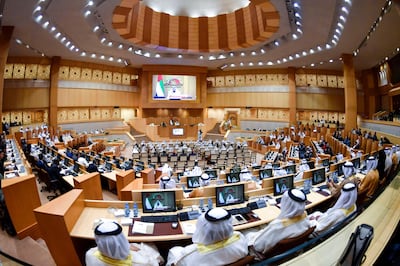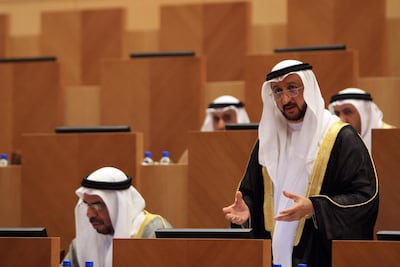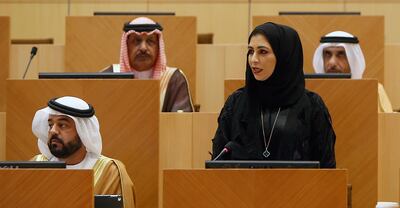In 2010, Sultan Al Suweidi raised a question that he still raises today: when will the country’s consultative body be given the power to legislate?
Mr Al Suweidi was then representing Dubai on the Federal National Council, which has seen some significant changes over the past 10 years.
The number of people eligible to vote or stand for seats in half of the assembly has grown substantially, many of its proposals have been written into law and a constitutional amendment in 2009 doubled the term for members to four years.
But members have repeatedly said that the FNC should have the ability to hold government bodies accountable, to oversee the implementation of its proposals – and to create legislation.
“The council was more dynamic and active than it is now,” Mr Al Suweidi said of his term. “We witnessed the most important changes concerning the council’s law and we gave the council the right to look into international agreements and its own budget.
“If the members continued to update the council’s law since that time until now, it would have had a better role. By now it could have been given a role in drafting legislation, a more legislative role.”
But he is conscious of the good work being carried out by the current council, 20 of whom are elected while the other 20 are appointed by the Rulers of each emirate.
The first FNC elections were conducted in 2006, and in the term following the council urged the government to find urgent, long-term solutions for population imbalance, which members viewed as a threat to national security.
“This issue has haunted everyone – the people, the leaders and members of the FNC,” Mr Al Suweidi says. “And even today the issue is addressed by our fellow members.”
In 2010, Mr Al Suweidi questioned the government over what they were doing about the security threats imposed by the population structure, including the fact that much of the workforce was not Arab.
“The country is undergoing a major development and people are coming from everywhere,” he said. “The crime rate is rising.”
Mr Al Suweidi raised a question back then to Sheikh Saif bin Zayed, Deputy Prime Minister and Minister of Interior, about the initiatives of the Federal Demographic Council, which had been recently established.
Eight years later, Mr Al Suweidi acknowledges the council’s work towards balancing the population.
“They have put in a lot of effort such as population statistics, looking for ways to develop society and keeping an eye out for problems brought by foreign workers,” he said.
“This issue requires adequate solutions. A day will come when we feel sorry because then the solutions will be very difficult. The earlier we start in solving this problem the better.”

His concerns have been shared by current council member Hamad Al Rahoomi, whose proposal to enforce a good conduct certificate requirement for expatriate workers became a reality last February.
It has since been postponed because it was realised that more time would be needed for its implementation.
On several occasions, Mr Al Rahoomi has said that such a certificate is necessary to avoid bringing criminals into the country.
FNC members have always been aware of their restrictions and are eager to see their responsibilities grow.
Currently led by President Dr Amal Al Qubaisi – the first female leader of a national assembly in the region – the council has an advisory role, and the government can choose whether or not to implement their recommendations.
But its members have never been backwards when it comes to asking the big questions and on many occasions they have chided members of Cabinet for not appearing at a council session when requested.
_____________
Read more of our 10-year anniversary coverage here:
SPECIAL REPORT: Chronicling 10 years of change in the UAE
The art of institution building
A decade of media experimentation
Technology has transformed every aspect of life in UAE
____________
In March 2010, members voiced their concerns to the government because plans for the term that was due to start in 2011 had not announced. They were keen, as always, in the FNC’s evolution.
“Will the same process of having a half-elected council be repeated?” asked Abdul Raheem Shaheen, who represented Ras Al Khaimah at the time.
“Will the term end without introducing a new council? If elections are held, will we see an increase in the number of voters?”
The announcement for the country’s second elections was eventually made in February 2011, and the number of eligible voters was tripled for each emirate.
The number of people who could vote or stand in FNC elections has been steadily increasing since the first elections.
In 2006, 6,689 people were given the franchise or to stand for a position across the emirates. In 2011, that number rose to 135,308, and in 2015, it increased by 66 per cent to 224,279 electors.
Another issue that has been carried by current members from their predecessors, is the freezing of embryos. When the council discussed the draft law on fertility clinics in 2007, they debated with Humaid Al Qatami, the former minister of health, on allowing embryos to be frozen.
Mr Al Qatami said freezing embryos could be un-Islamic but some members presented him with scholarly opinions proving the contrary, and a committee was assigned to consult the Islamic Affairs Authority.
Regardless, the law eventually allowed the freezing of unfertilised eggs only. This drove current member Azza bin Suleiman to revisit the issue last year.
Mrs bin Suleiman asked the Minister of Health, Abdulrahman Al Owais, to revise the law and allow embryos to be frozen in the UAE. Mr Al Owais sent a written reply saying the amendment had already been drafted and raised to the Cabinet for approval.
But the amendment had not yet been referred to the FNC. All laws need to be passed through the council for discussion before going to the President for final approval.
“I came across this issue during an official visit we made to Belgium,” Mrs bin Suleiman said. “We came across around a hundred cases of Emiratis seeking this procedure.”




